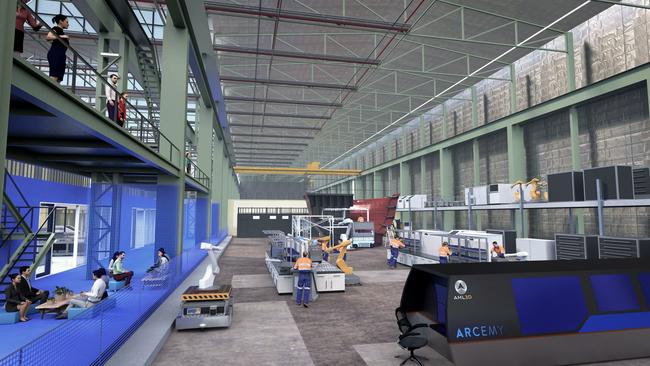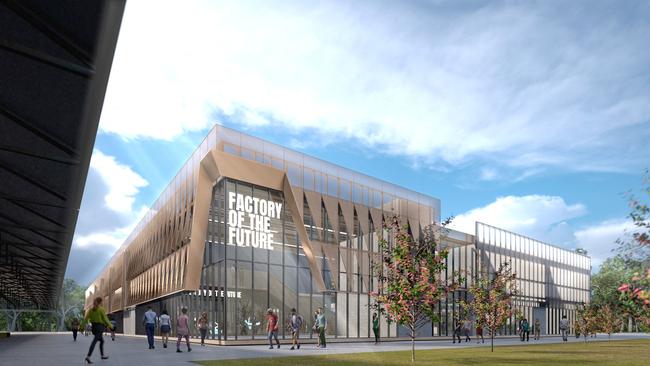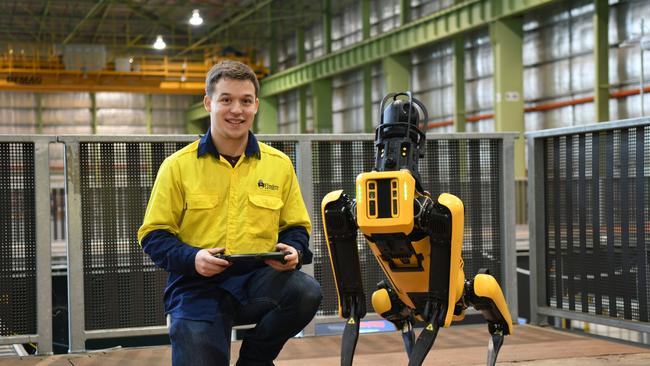Factory of the Future expansion, Flinders at Tonsley bid for federal funding for larger facility
An army of skilled workers, including robots and robodogs, is awaiting a greenlight for funding to supercharge the Tonsley Factory of the Future into a hothouse for innovation.
SA News
Don't miss out on the headlines from SA News. Followed categories will be added to My News.
A $67m plan for supersizing Tonsley’s “Factory of the Future”, harnessing the power of 250 companies and training an army of skilled workers – including how to work with robots, even “robodogs” – hinges on federal funds.
Aimed at being a hothouse for manufacturing innovation, supercharging the state’s capacity to make things again, it will allow businesses to experiment before committing to big investments in upgrading their own plants.
The first phase of the ambitious project, a pop-up test lab for trying out latest manufacturing technologies and focusing on shipbuilding – opened last year on the very site where the last Mitsubishi cars rolled off the production line.
Flinders University and BAE Systems Australia, which established the pilot, are about to start building something bigger.

With $5m funding each from the state government and Flinders, construction of a permanent Factory of the Future will begin in February and be finished by November 2022.
It will allow for a range of innovative SA companies including 3D-printing experts AML3D, as well as Cohda Wireless and CISCO, to come on board.
But that pales into comparison with the third phase, for which a consortium of tech companies including K-Tig, Speed3D, SAGE, Lumination and Chironix have joined forces to lobby for $22m in federal funds.
Flinders, the state government and industry partners would provide the balance of the $67m.
It would hugely expand the “factory’s” capacity, enabling BAE and Flinders to work with about 250 companies on shipbuilding R and D projects over the next four years.
It would also be used to train the thousands of workers required to build hi-tech vessels including the Hunter Class Frigates.
An announcement is expected within weeks on the funding outcome.

Flinders University Professor John Spoehr said every stage of the project was about testing and trialling advanced manufacturing technologies and techniques in a factory environment, before adapting them to the Osborne shipyard and other industrial sectors.
Prof Spoehr said if people were going to work closely with robots in the future, we need to learn how to get along on the factory floor, so industrial research in the innovation district at Tonsley was exploring the “terms of engagement”.
“We’re focusing on how we can overcome some of those fears, concerns and potential occupational health and safety hazards,” he said.
Prof Spoehrs said it was about “really looking at human barriers to the uptake and diffusion of those technologies, recognising that there are all sorts of issues associated with the interaction between humans and machines”.
BAE Systems naval shipbuilding strategy director Sharon Wilson said it was crucial for such research and experimentation to be done locally for the sake of the nation’s manufacturing future.
Valerie O’Keeffe, a Flinders expert in work health and safety working in the test lab, also has a background in psychology.
“Technology needs to be fit for the environment that the person’s working in, otherwise it won’t be accepted,” she said.
Her next trial will explore the effects of working in hot conditions, monitoring heart rate and body temperature while completing challenging tasks in confined spaces.

Boston Dynamics’ robot dog Spot is a recent, popular addition to the lab. Ms O’Keeffe said the concept of a collaborative robot or “cobot” was still quite new and people tended to respond in different ways.
Some were excited and welcoming, patting the machine and calling it “him” or “her”, while others recoiled in horror.
Flinders robotics engineering graduate Kosta Manning joined the lab after a successful work placement.
He’s now working on a joint project exploring the factors influencing uptake of modern manufacturing technologies.
The results of the experiments are shared freely and openly with industry, including small to medium enterprises as well as global corporations.





